
Sir Terence David John Pratchett was an English author, humorist, and satirist, best known for his 41 comic fantasy novels set on the Discworld, and for the apocalyptic comedy novel Good Omens (1990) which he wrote with Neil Gaiman.
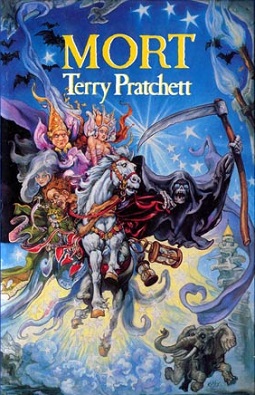
Mort is a fantasy novel by British writer Terry Pratchett. Published in 1987, it is the fourth Discworld novel and the first to focus on the character Death, who only appeared as a side character in the previous novels. The title is the name of its main character, and is also a play on words: in French and Catalan, mort means "death", while in Romanian means "dead". The French language edition is titled Mortimer, and the Catalan language edition is titled Morth.

Soul Music is a fantasy novel by British writer Terry Pratchett, the sixteenth book in the Discworld series, first published in 1994. Like many of Pratchett's novels it introduces an element of modern society into the magical and vaguely late medieval, early modern world of the Discworld, in this case Rock and Roll music and stardom, with near disastrous consequences. It also introduces Susan Sto Helit, daughter of Mort and Ysabell and granddaughter of Death.
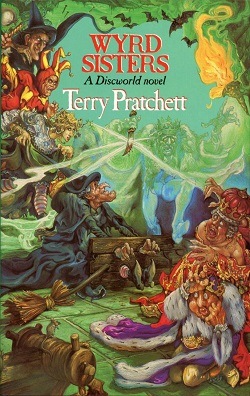
Wyrd Sisters is Terry Pratchett's sixth Discworld novel, published in 1988. It re-introduces Granny Weatherwax of Equal Rites.

The Colour of Magic is a 1983 fantasy comedy novel by Terry Pratchett, and is the first book of the Discworld series. The first printing of the British edition consisted of only 506 copies. Pratchett has described it as "an attempt to do for the classical fantasy universe what Blazing Saddles did for Westerns."

Eric, stylized as Faust Eric, is the ninth Discworld novel by Terry Pratchett. It was originally published in 1990 as a "Discworld story", in a larger format than the other novels and illustrated by Josh Kirby. It was later reissued as a normal paperback without any illustrations, and in some cases, with the title given on the cover and title pages simply as Eric.

Susan Sto Helit, once referred to as Susan Death, is a fictional character in Terry Pratchett's Discworld series of fantasy novels. She is the granddaughter of Death, the Disc's Grim Reaper, and has a number of his abilities. She appears in three Discworld novels: Soul Music, Hogfather, and Thief of Time. Being both human and supernatural, Susan is frequently and reluctantly forced away from her attempts at normal life to do battle with malign supernatural forces or to take on her grandfather's job in his absence. Death tends to rely on her in his battles against the Auditors of Reality, particularly in situations where he has no power or influence. As the series progresses, she also begins to take on roles educating children, so that, as Pratchett mentions in The Art of Discworld, she has "ended up, via that unconscious evolution that dogs characters, a kind of Goth Mary Poppins".

Esmerelda "Esme" Weatherwax is a fictional character from Terry Pratchett's Discworld series. She is a witch and member of the Lancre coven. She is the self-appointed guardian of her small country, and frequently defends it against supernatural powers. She is one of the Discworld series's main protagonists, having major roles in seven novels.

Gytha Ogg is a character from Terry Pratchett's Discworld series. She is a witch and a member of the Lancre Coven. Gytha is known for her practical approach to magic and her no-nonsense attitude. She is also renowned for her culinary skills and is an excellent cook. Gytha Ogg is often depicted as a strong, capable, and independent character, with a sharp sense of humor. She frequently appears in the Discworld series, particularly in the books featuring the Lancre witches.

Hogfather is the 20th Discworld novel by Terry Pratchett, and a 1997 British Fantasy Award nominee. It was first released in 1996 and published by Victor Gollancz. It came in 137th place in The Big Read, a BBC survey of the most loved British books of all time, making it one of fifteen books by Pratchett in the Top 200.

Thief of Time is a fantasy novel by British writer Terry Pratchett, the 26th book in his Discworld series. It was the last Discworld novel with a cover by Josh Kirby.
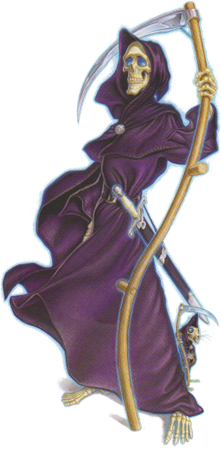
Death is a fictional character in Terry Pratchett's Discworld series and a parody of several other depictions of the Grim Reaper. He is a black-robed skeleton who usually carries a scythe. His jurisdiction is specifically the Discworld itself; he is only a minion of Azrael, the universal Death. Pratchett explores human existence through his depiction of death, which became more sympathetic throughout the series.
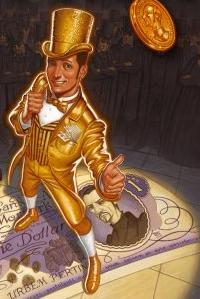
Moist von Lipwig is a fictional character from Terry Pratchett's Discworld series. A "reformed con-man" who is one of the major characters of the series, Von Lipwig is the protagonist of the novels Going Postal, Making Money, and Raising Steam.

The Discworld is the fictional setting for all of Terry Pratchett's Discworld fantasy novels. It consists of a large disc resting on the backs of four huge elephants which are in turn standing on the back of an enormous turtle, named Great A'Tuin as it slowly swims through space. The Disc has been shown to be heavily influenced by magic and, while Pratchett gave it certain similarities to planet Earth, he also created his own system of physics for it.

Terry Pratchett's The Colour of Magic is a fantasy-comedy two-part British television adaptation of the bestselling novels The Colour of Magic (1983) and The Light Fantastic (1986) by Terry Pratchett. The fantasy film was produced for Sky1 by The Mob, a small British studio, starring David Jason, Sean Astin, Tim Curry, and Christopher Lee as the voice of Death. Vadim Jean both adapted the screenplay from Pratchett's original novels, and served as director.
Wyrd Sisters is a six-part animated television adaptation of the book of the same name by Terry Pratchett, produced by Cosgrove Hall Films, and first broadcast on 18 May 1997. It was the second film adaptation of an entire Discworld novel.

Discworld is a comic fantasy book series written by the English author Terry Pratchett, set on the Discworld, a flat planet balanced on the backs of four elephants which in turn stand on the back of a giant turtle. The series began in 1983 with The Colour of Magic and continued until the final novel The Shepherd's Crown, which was published in 2015, following Pratchett's death. The books frequently parody or take inspiration from classic works, usually fantasy or science fiction, as well as mythology, folklore and fairy tales, and often use them for satirical parallels with cultural, political and scientific issues.
The Watch is a fantasy police procedural television programme inspired by the Ankh-Morpork City Watch from the Discworld series of fantasy novels by Terry Pratchett. The series, developed by BBC Studios for BBC America, premiered on 3 January 2021 and was released on BBC iPlayer on 1 July 2021.
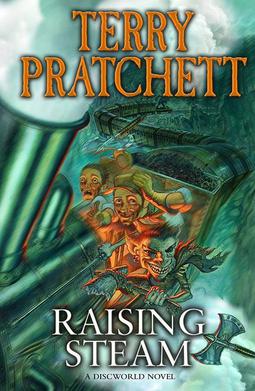
Raising Steam is the 40th Discworld novel, written by Terry Pratchett. It was the penultimate one, published before his death in 2015. Originally due to be published on 24 October 2013, it was pushed back to 7 November 2013. It stars Moist von Lipwig, and features the introduction of locomotives to the Discworld, and an entirely new character.














